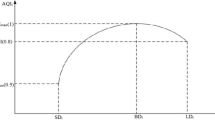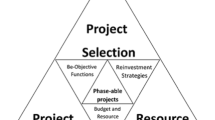Abstract
This study explores the intricate integration and synchronization of supplier selection with the optimal scheduling of multi-mode resource-constrained projects, which is a genuine and complex challenge prevalent in the construction industry, by proposing new multi-objective mathematical modeling considering various items. Within this context, a multifaceted network of concurrent projects (multi-project) is examined with different suppliers’ resources (multi-supplier) to minimize the overall projects’ delay times and associated costs. The mathematical model formulation also incorporates diverse implementation modes (multi-mode) and the time value of money (TVM). To use and unravel the complexities of the proposed model, two distinct algorithms, including a multi-objective whale optimization algorithm (WOA) based on the Pareto archive and the well-known non-dominated sorting genetic algorithm II (NSGA-II), are employed. The algorithms were subjected to a comparative analysis of several sample problems and evaluated against multi-objective criteria, including quality metric (QM), diversity metric (DM), spacing metric (SM), number of solutions (NOS), mean Ideal distance (MID), and computational time. The evaluation reveals that the tailored multi-objective WOA outperforms NSGA-II, exhibiting greater solution precision and diversity. The WOA demonstrates an enhanced ability to efficiently explore the problem’s feasible solution space, albeit at the increased computational time to pinpoint optimal solutions. Notably, the validity and practicality of the proposed model and method were field-tested within the context of construction projects in Iran, with the obtained results juxtaposed against the real-world data. The comparative analysis indicates that implementing the scheduling approach and solution methodology espoused by the multi-objective WOA led to significant improvements, with financial gains of up to 6% and time savings reaching 16%. Overall, this research substantiates the proposed model and algorithms’ benefits in reducing project costs and delays, offering valuable insights for construction industry practitioners.










Similar content being viewed by others
Data availability
The required data and descriptions are provided in the article.
References
Abbasi S, Choukolaei HA (2023) A systematic review of green supply chain network design literature focusing on carbon policy. Decis Anal J 6:100189
Abbasi S, Erdebilli B (2023) Green closed-loop supply chain networks’ response to various carbon policies during COVID-19. Sustainability 15(4):3677
Abbasi S, Daneshmand-Mehr M, Ghane KA (2021) The sustainable supply chain of CO2 emissions during the coronavirus disease (COVID-19) pandemic. J Ind Eng Int 17(4):83–108
Abbasi S, Sıcakyz Ç, Erdebilli B (2023) Designing the home healthcare supply chain during a health crisis. J Eng Res. https://doi.org/10.1016/j.jer.2023.100098
Amirian H, Bashiri M, Sahraeian R (2014) A novel DOE-based selection operator for NSGA-II algorithm. 2nd National Conference on Industrial Engineering & Systems, Iran
Artigues C, Demassey S, Neron E (2013) Resource-constrained project scheduling: models, algorithms, extensions and applications. John Wiley & Sons
Asadujjaman M, Rahman HF, Chakrabortty RK, Ryan MJ (2021) Resource constrained project scheduling and material ordering problem with discounted cash flows. Comput Ind Eng 158:107427
Azarkish M, Aghaeipour Y (2022) A fuzzy bi-objective mathematical model for multi-depot electric vehicle location routing problem with time windows and simultaneous delivery and pick-up. Asian J Basic Sci Res 4(2):01–03
Chen R-M, Wu C-L, Wang C-M, Lo S-T (2010) Using novel particle swarm optimization scheme to solve resource-constrained scheduling problem in PSPLIB. Expert Syst Appl 37(3):1899–1910
Chen W, Lei L, Wang Z, Teng M, Liu J (2018) Coordinating supplier selection and project scheduling in resource-constrained construction supply chains. Int J Prod Res 56(19):6512–6526
Cheng J, Fowler J, Kempf K, Mason S (2015) Multi-mode resource-constrained project scheduling problems with non-preemptive activity splitting. Comput Oper Res 53:275–287
De Buck V, López CA, Nimmegeers P, Hashem I, Van Impe J (2019) Multi-objective optimisation of chemical processes via improved genetic algorithms: a novel trade-off and termination criterion. InComput Aided Chem Eng 46:613–618
Deb K (2014) Multi-objective optimization. Search methodologies. Springer, Boston, MA, pp 403–449. https://scholar.google.co.uk/citations?view_op=view_citation&hl=en&user=paTAXiIAAAAJ&citation_for_view=paTAXiIAAAAJ:JavbeY_VQWIC
Deb K, Agrawal S, Pratap A, Meyarivan T (2000) A fast elitist non-dominated sorting genetic algorithm for multi-objective optimization: NSGA-II. InParallel Problem Solving from Nature PPSN VI: 6th International Conference Paris, France, pp 849–858
Deb K, Pratap A, Agarwal S, Meyarivan T (2002) A fast and elitist multiobjective genetic algorithm: NSGA-II. IEEE Trans Evol Comput 6(2):182–197
Dodin B, Elimam A (2001) Integrated project scheduling and material planning with variable activity duration and rewards. IIE Trans 33(11):1005–1018
Dodin B, Elimam AA (2008) Integration of equipment planning and project scheduling. Eur J Oper Res 184(3):962–980
Elmughrabi W, Sassi OB, Dao T-M, Chabaane A (2020) Collaborative supply chain planning and scheduling of construction projects. IFAC-PapersOnLine 53(2):10761–10766
Eshraghi A (2016) A new approach for solving resource constrained project scheduling problems using differential evolution algorithm. Int J Ind Eng Comput 7(2):205–216
Forcael E, González M, Soto J, Ramis F, Rodríguez C (2018) Simplified scheduling of a building construction process using discrete event simulation. 16th LACCEI International Multi-Conference for Engineering, Education, and Technology: Innovation in Education and Inclusion
Fu F, Xing W (2021) An agent-based approach for project-driven supply chain under information asymmetry. Comput Ind Eng 158:107410
Gao W, Abdi-khanghah M, Ghoroqi M, Daryasafar A, Lavasani M (2018) Flow reversal of laminar mixed convection for supercritical CO2 flowing vertically upward in the entry region of asymmetrically heated annular channel. J Supercrit Fluids 131:87–98
García-Nieves JD, Ponz-Tienda JL, Ospina-Alvarado A, Bonilla-Palacios M (2019) Multipurpose linear programming optimization model for repetitive activities scheduling in construction projects. Autom Constr 105:102799
Ghoroqi M, Ghoddousi P, Makui A, Shirzadi Javid AA, Talebi S (2023) An integrated model for multi-mode resource-constrained multi-project scheduling problems considering supply management with sustainable approach in the construction industry under uncertainty using evidence theory and optimization algorithms. Buildings. https://doi.org/10.3390/buildings13082023
Habibi F, Barzinpour F, Sadjadi SJ (2017) A multi-objective optimization model for project scheduling with time-varying resource requirements and capacities. J Ind Syst Eng 10:92–118
Habibi F, Barzinpour F, Sadjadi SJ (2019) A mathematical model for project scheduling and material ordering problem with sustainability considerations: a case study in Iran. Comput Ind Eng 128:690–710
Hansen P, Mladenović N, Moreno Perez JA (2010) Variable neighbourhood search: methods and applications. Ann Oper Res 175:367–407
Herroelen W (2005) Project scheduling—theory and practice. Prod Oper Manag 14(4):413–432
Joo B, Chua P (2017) Multimode resource-constrained multi-project scheduling with ad hoc activity splitting. 2017 IEEE International Conference on Industrial Engineering and Engineering Management (IEEM)
Kannimuthu M, Ekambaram P, Raphael B, Kuppuswamy A (2018) Resource unconstrained and constrained project scheduling problems and practices in a multiproject environment. Adv Civil Eng. https://doi.org/10.1155/2018/9579273
Khandelwal M, Marto A, Fatemi SA, Ghoroqi M, Armaghani DJ, Singh TN, Tabrizi O (2018) Implementing an ANN model optimized by genetic algorithm for estimating cohesion of limestone samples. Eng Comput 34:307–317
Liu SS, Chen WT (2012) Construction multi-project scheduling model considering different resource allocation behavior. Appl Mech Mater. https://doi.org/10.4028/www.scientific.net/AMM.174-177.2815
Love PE, Irani Z, Edwards DJ (2004) A seamless supply chain management model for construction. Supply Chain Manag: Int J. https://doi.org/10.1108/13598540410517575
Mirjalili S, Lewis A (2016) The whale optimization algorithm. Adv Eng Softw 95:51–67
Mohammed HM, Umar SU, Rashid TA (2019) A systematic and meta-analysis survey of whale optimization algorithm. Comput Intell Neurosci. https://doi.org/10.1155/2019/8718571
Mojtahedi SF, Tabatabaee S, Ghoroqi M, Soltani Tehrani M, Gordan B, Ghoroqi M (2019) A novel probabilistic simulation approach for forecasting the safety factor of slopes: a case study. Eng Comput 35:637–646
Montgomery DC (2017) Design and analysis of experiments. John wiley & sons, Hoboken
Nabipoor Afruzi E, Aghaie A, Najafi AA (2020) Robust optimization for the resource-constrained multi-project scheduling problem with uncertain activity durations. Scientia Iranica 27(1):361–376
Néron E, Baptista D (2002) Heuristics for the multi-skill project scheduling problem. International Symposium on Combinatorial Optimization (CO’2002)
Pinha D, Ahluwalia R, Senna P (2016) The combinatorial multi-mode resource constrained multi-project scheduling problem. Int J Supply Oper Manag 3(3):1391–1412
Rahimi I, Gandomi AH, Deb K, Chen F, Nikoo MR (2022) Scheduling by NSGA-II: review and bibliometric analysis. Processes 10(1):98
Rahman HF, Chakrabortty RK, Ryan MJ (2020) Memetic algorithm for solving resource constrained project scheduling problems. Autom Constr 111:103052
Rana N, Latiff MS, Abdulhamid SI, Chiroma H (2020) Whale optimization algorithm: a systematic review of contemporary applications, modifications and developments. Neural Comput Appl 32:16245–16277
Rao PB, Chaitanya K (2015) Resource constrained project scheduling problems-a review article. Int J Sci Res 4(3):1509–1512
Reza Hoseini A, Noori S, Ghannadpour SF (2021) Integrated scheduling of suppliers and multi-project activities for green construction supply chains under uncertainty. Autom Constr 122:103485
Shadrokh S, Kianfar F (2007) A genetic algorithm for resource investment project scheduling problem, tardiness permitted with penalty. Eur J Oper Res 181(1):86–101
Shahnazar A, Nikafshan Rad H, Hasanipanah M, Tahir MM, Jahed Armaghani D, Ghoroqi M (2017) A new developed approach for the prediction of ground vibration using a hybrid PSO-optimized ANFIS-based model. Environ Earth Sci 76:1–7
Sharma S, Bansal V (2018) Location-based planning and scheduling of highway construction projects in hilly terrain using GIS. Can J Civ Eng 45(7):570–582
Shen Y, Zhang C, Gharehchopogh FS, Mirjalili S (2023) An improved whale optimization algorithm based on multi-population evolution for global optimization and engineering design problems. Expert Syst Appl 215:119269
Sheykh SM, Shadrokh S, Hasanzadeh F (2009) Concurrent project scheduling and material planning: a genetic algorithm approach. Scientia iranica, transaction E: industrial engineering, Vol 16, No 2. Sharif University of Technology, pp 91–99. https://scientiairanica.sharif.edu/article_3289_72ee52614bd0be61c2aa5a5e5ec6006f.pdf
Shirzadi Javid AA, Abolghasemi MS, Ghoroqi M. (2017) The investigation of the effective factors on the maintenance and repair of installations in hospitals. 1st National Conference on Repair and Maintenance of Concrete Structures
Shtub A (1988) The integration of CPM and material management in project management. Constr Manag Econ 6(4):261–272
Singh A (2014) Resource constrained multi-project scheduling with priority rules & analytic hierarchy process. Procedia En 69:725–734
Smith-Daniels DE, Aquilano NJ (1984) Constrained resource project scheduling subject to material constraints. J Oper Manag 4(4):369–387
Song W, Kang D, Zhang J, Xi H (2016) Decentralized multi-project scheduling via multi-unit combinatorial auction. Proceedings of the 2016 International Conference on Autonomous Agents & Multiagent Systems, pp 836–844
Suresh M, Dutta P, Jain K (2015) Resource constrained multi-project scheduling problem with resource transfer times. Asia-Pacific J Oper Res 32(06):1550048
Tabrizi BH, Ghaderi SF (2015) An integrated mixed-integer programming model to address concurrent project scheduling and material ordering. Int J Ind Manuf Eng 9(11):1960–1963
Tavakkoli-Moghaddam R, Azarkish M, Sadeghnejad-Barkousaraie A (2011) A new hybrid multi-objective Pareto archive PSO algorithm for a bi-objective job shop scheduling problem. Expert Syst Appl 38(9):10812–10821
Tonnizam Mohamad E, Jahed Armaghani D, Ghoroqi M, Yazdani Bejarbaneh B, Ghahremanians T, Abd Majid MZ, Tabrizi O (2017) Ripping production prediction in different weathering zones according to field data. Geotech Geol Eng 35:2381–2399
Van Peteghem V, Vanhoucke M (2010) A genetic algorithm for the preemptive and non-preemptive multi-mode resource-constrained project scheduling problem. Eur J Oper Res 201(2):409–418
Vanhoucke M, Coelho J (2019) Resource-constrained project scheduling with activity splitting and setup times. Comput Oper Res 109:230–249
Wang L, Fang C (2011) An effective shuffled frog-leaping algorithm for multi-mode resource-constrained project scheduling problem. Inf Sci 181(20):4804–4822
Wang H-W, Lin J-R, Zhang J-P (2020) Work package-based information modeling for resource-constrained scheduling of construction projects. Autom Constr 109:102958
Zoraghi N, Shahsavar A, Abbasi B, Van Peteghem V (2017) Multi-mode resource-constrained project scheduling problem with material ordering under bonus–penalty policies. TOP 25(1):49–79
Funding
This research received no external funding.
Author information
Authors and Affiliations
Corresponding author
Ethics declarations
Conflict of interest
The authors declare that there is no conflict of interest..
Rights and permissions
Springer Nature or its licensor (e.g. a society or other partner) holds exclusive rights to this article under a publishing agreement with the author(s) or other rightsholder(s); author self-archiving of the accepted manuscript version of this article is solely governed by the terms of such publishing agreement and applicable law.
About this article
Cite this article
Ghoroqi, M., Ghoddousi, P., Makui, A. et al. Integration of resource supply management and scheduling of construction projects using multi-objective whale optimization algorithm and NSGA-II. Soft Comput (2024). https://doi.org/10.1007/s00500-023-09467-0
Accepted:
Published:
DOI: https://doi.org/10.1007/s00500-023-09467-0




